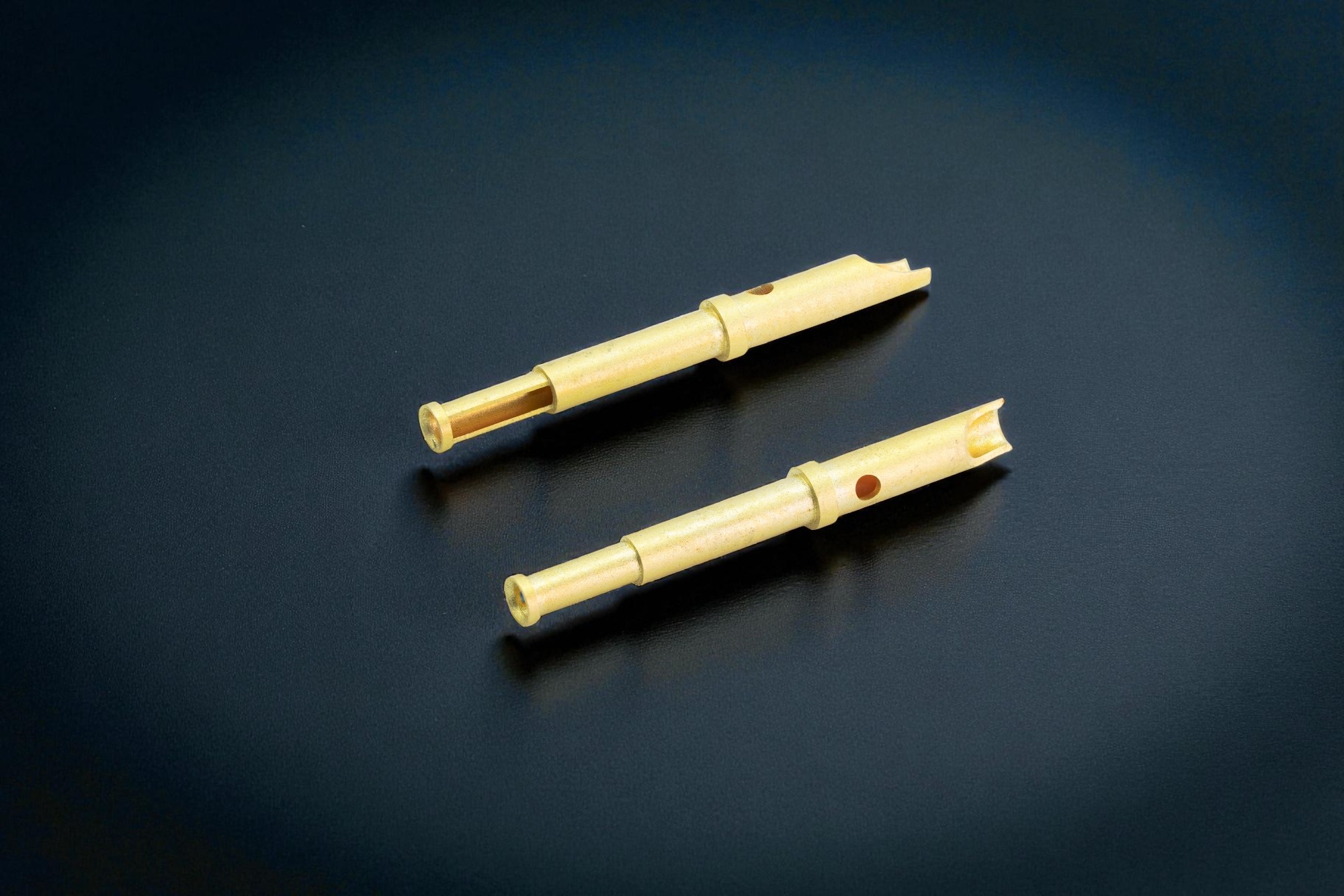By Franky Nguyen, AVF Decolletage
Introduction
Connector pins and sockets are small, but their impact on electronic reliability is massive. In complex systems—from aerospace controls to medical equipment—a single connector failure can stop an entire operation.
When a connector pin loses contact, overheats, or corrodes, it disrupts the performance of sensors, circuit boards, and power modules. These failures aren’t random; they are often the direct result of poor machining, inconsistent materials, or inadequate plating.
At AVF Decolletage, we understand that precision is the best form of prevention. Through Swiss CNC and CAM machining, ISO-certified processes, and strict inspection standards, we manufacture connector pins and sockets engineered to perform flawlessly over millions of cycles.
Learn more about our precision connector manufacturing services
Common Causes of Connector Failures
Connector reliability depends on mechanical precision and material consistency. Below are the most common reasons connectors fail—and how machining directly addresses them.
⚙️ 1. Poor Tolerances
When pins and sockets don’t fit perfectly, even tiny dimensional errors cause unstable contact pressure. This leads to micro-arcing, vibration-induced wear, and eventually connection loss.
Swiss machining ensures ±0.005 mm accuracy, preventing these tolerance-related failures.
2. Rough or Burr-Heavy Surfaces
Microscopic burrs or uneven finishes increase contact resistance, generating heat and energy loss. Over time, this heat accelerates oxidation, which weakens the connection.
At AVF Decolletage, automated deburring and precision finishing produce smooth, burr-free surfaces that enhance conductivity and reduce wear.
⚡ 3. Inconsistent or Thin Plating
Uneven gold or nickel plating leaves small unprotected areas that corrode under moisture or high current. This degradation is one of the most common causes of long-term failure.
We partner with qualified plating suppliers in Singapore and the USA to apply uniform, tightly controlled coatings that extend component lifespan.
4. Material Inconsistency
Using low-quality metal alloys may reduce cost initially, but they deform, crack, or lose conductivity under thermal stress.
AVF Decolletage uses only certified brass (C36000, C17300, C54400), stainless steel (303, 304, 316, 416), and aluminum (AL6061, AL2017) from approved sources.

How Precision Machining Prevents Failures
Precision machining doesn’t just make parts fit better — it ensures consistency, durability, and conductivity from the first production run to the millionth.
1. Tight Tolerances Ensure Reliable Contact
Swiss CNC machining achieves micron-level accuracy (±0.005 mm). This level of control eliminates dimensional variation, ensuring each connector pin fits securely inside its socket.
Stable contact pressure prevents micro-movement, arcing, and early wear, ensuring long-term performance even in vibration-heavy environments.
2. Burr-Free Finishes Reduce Electrical Resistance
Every cut and contour is critical in high-frequency or power connectors.
At AVF Decolletage, advanced tooling and automated deburring create mirror-smooth surfaces. This reduces contact resistance, lowers heat generation, and improves signal clarity across high-speed circuits.
⚡ 3. Controlled Plating Guarantees Corrosion Protection
Connector reliability depends heavily on plating quality.
Our approved suppliers in Singapore and the USA apply gold, nickel, and tin plating to precise thickness specifications, verified through plating adhesion and cross-section testing.
This consistency ensures corrosion resistance and stable performance even under humidity, temperature changes, and repeated mating cycles.
4. Premium Materials Deliver Strength and Conductivity
Each alloy is selected for the balance between strength and electrical performance.
-
Brass provides conductivity and easy machinability.
-
Stainless steel resists deformation and corrosion.
-
Aluminum offers lightweight strength for aerospace and EV connectors.
By combining these materials with precision geometry, AVF Decolletage ensures every pin and socket maintains mechanical integrity under load and thermal stress.
Industries That Depend on Reliable Connectors
Connector reliability is vital in industries where a single failure can result in safety risks, downtime, or financial loss.
✈ Aerospace & Defense
Connectors must withstand vibration, high temperature, and pressure changes while maintaining signal integrity in flight systems.
Medical Devices
Diagnostic and surgical equipment demand flawless connectivity to ensure accuracy and patient safety.
Automotive & Electric Vehicles (EVs)
Precision connectors are essential for battery systems, sensors, and control modules, which face heat and vibration daily.
Telecommunications & Data Systems
In 5G and high-speed networks, connectors must sustain low resistance and high signal fidelity to avoid data loss.
AVF Decolletage: Precision You Can Trust
At AVF Decolletage, we don’t just produce connector pins and sockets — we engineer reliability.
With more than 350 Swiss CAM and CNC machines, a skilled workforce, and ISO 9001:2015–certified quality systems, we ensure that every part meets or exceeds international standards.
Our Quality Measures Include:
-
Dimensional inspections with Mitutoyo and Keyence systems.
-
Plating verification for thickness and adhesion.
-
Material certification to guarantee mechanical and electrical consistency.
-
Process traceability for every production batch.
By integrating Swiss precision, global plating expertise, and meticulous inspection, we eliminate the root causes of connector failure before they ever reach your assembly line.
Learn more about our quality system
Conclusion
Connector failures are rarely accidents — they’re preventable. With precision machining, controlled plating, and certified materials, you can eliminate instability, resistance, and corrosion from the start.
At AVF Decolletage, every connector pin and socket is built with one purpose: to perform perfectly, every time.
From aerospace to automotive, we deliver the precision and reliability your systems demand — because quality is not an option, it’s our standard.
Frequently Asked Questions (FAQ)
Q1: What causes most connector failures?
Loose tolerances, poor surface finishes, and inconsistent plating are the leading factors behind connection instability and corrosion.
Q2: How does plating affect connector reliability?
Uniform plating prevents oxidation and reduces resistance, extending connector life and maintaining signal quality.
Q3: Why is precision machining critical for connectors?
It ensures dimensional consistency, smooth surfaces, and stable electrical contact — key to long-term reliability.
Q4: Which industries rely most on precision connectors?
Aerospace, medical, automotive, and telecommunications — where performance and safety are paramount.
Q5: How does AVF Decolletage guarantee reliability?
Through Swiss machining accuracy, ISO-certified inspection, and partnerships with qualified plating providers.


